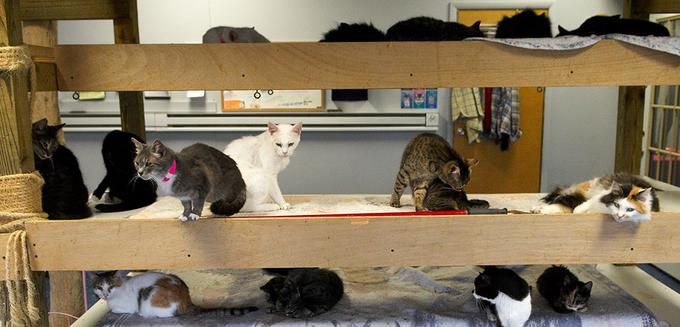animal hoarding awareness and cleaning services
Good intent gone awry is a great way to describe the conditions
when things get out of control with your pets. According to Wikipedia: Animal hoarding is keeping a higher-than-usual number of animals as domestic pets without ability to properly house or care for them, while at the same time denying this inability. Compulsive hoarding can be characterized as a symptom of mental disorder rather than deliberate cruelty towards animals.
Signs that may indicate someone is an animal hoarder according to the ASPCA:
- They have numerous animals and may not know the total number of animals in their care.
- Their home is deteriorated (i.e., dirty windows, broken furniture, holes in wall and floor, and extreme clutter).
- There is a strong smell of ammonia, and floors may be covered with dried feces, urine, vomit, etc.
- Animals are emaciated, lethargic and not well socialized.
- Fleas and vermin are present.
- Individual is isolated from community and appears to be in neglect himself.
- Individual insists all animals are happy and healthy—even when there are clear signs of distress and illness.
Living with animal feces and urine
Living with animal feces can pose serious health hazards. Exposure to animal feces can lead to the spread of various diseases and infections, including E.coli, Salmonella, and Campylobacter. These diseases can cause symptoms such as diarrhea, vomiting, and fever, and in severe cases, they can even be life-threatening.
In addition, animal feces can also contain harmful parasites such as roundworms and tapeworms, which can cause serious health problems when they infect humans. Breathing in the dust from dried animal feces can also lead to respiratory problems such as asthma and bronchitis.
To prevent these health hazards, it is important to properly dispose of animal feces and maintain good hygiene practices, such as washing your hands thoroughly after handling animals or cleaning up their waste. It is also important to keep living areas clean and well-ventilated to reduce the risk of airborne pathogens.
How you can help
Not everyone who has multiple animals is an animal hoarder. However, if you think someone you know is struggling with animal hoarding, here are some ways you can help according to the ASPCA:
- Call your local humane law enforcement department, police department, animal welfare organization or veterinarian to initiate the process. A phone call may be the first step to getting hoarders and the animals the help they need.
- Contact social service groups. Your local department of the aging, adult protective services, health departments and other mental health agencies may be able to provide services or links to services.
- Reassure the animal hoarder that it’s okay to accept help. Animal hoarders are usually worried that their animals will be killed or that they will never see them again. Regardless of the outcome, assure them that the animals need urgent care and that immediate action is necessary.
- Volunteer your time. With the removal of so many animals from a hoarding situation, the burden on local shelters can be staggering. Volunteer your time to help clean cages, socialize animals, walk dogs and perform other such necessary duties.
- Keep in touch. It may be appropriate for animals to be spayed and neutered and returned to their home if an animal hoarder can provide—or can be aided in providing—care. Under the guidance of an organization, help the individual with daily animal care chores. And if the individual acquires new animals, help ensure that they are spayed/neutered and vaccinated.
Your love is recognized. Let’s put where it’s most helpful!
We hope you found this information useful!
-Hazmat Cleanup
If you’d like help cleaning up after a hoarder or any hoarding situation, contact us any time!
Get a Quote

